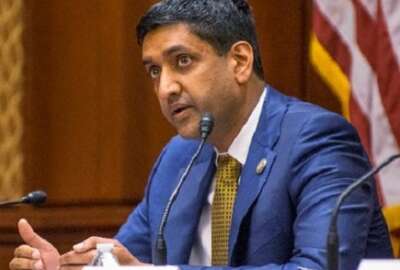

President Donald Trump on Thursday signed the 21st-Century Integrated Digital Experience Act (IDEA), which aims to make federal ".gov" websites more...
Amid shutdown woes, President Donald Trump signed the 21st-Century Integrated Digital Experience Act (IDEA) into law Thursday, which aims to make federal “.gov” websites more mobile-friendly and more secure.
“The 21st Century IDEA will modernize the technology of government agencies,” Rep. Khanna (D-Calf.) said following the signing ceremony. “It’s time our government agencies adopt the innovative technologies of the 21st Century.”
The bill seeks to close the “tech gap” between government and the private sector, and promotes greater availability of digital forms, the use of e-signatures and a better online experience for people with disabilities.
“There’s no reason our websites shouldn’t be as user-friendly and sophisticated as the websites of tech companies in my district,” Khanna, who represents Silicon Valley, said Dec. 5 on Federal Drive with Tom Temin after the House passed his bill.
The bill, also sponsored by Rep. John Ratcliffe (R-Texas) and Sen. Rob Portman (R-Ohio), tasks agency chief information officers and chief technology officers with implementing its provisions and reporting to Congress every two years on the progress made.
Khanna pointed to the Pentagon’s and White House’s websites as examples of well-designed government websites, and added that “a lot of the agencies have a lot of work to do.”
The Information Technology and Innovation Foundation, in a review of 500 of the most popular federal websites last year, found that 91 percent failed at least for metrics focused on accessibility and security. Only 63 percent of federal websites tested received a passing score for page-load speed, while 61 percent got a passing score for mobile-friendliness.
Dana Rao, Adobe’s executive vice president, said the president’s signing of 21st-Century IDEA stood out as a “bipartisan commitment to help our federal government modernize, transform, and make their services cost-effective and accessible to every citizen.”

“ServiceNow is pleased to have worked with lawmakers and other public-policy decision makers to bring the bill to fruition,” Osborn said. “ServiceNow has a valued relationship with the federal government, and we are grateful to be a chosen partner in the modernization of government IT and technology services.”
The 21st IDEA legislation piggybacks on some of the mobile-friendliness mandates in Rep. Robin Kelly’s (D-Ill.) Connected Government Act, which became law at the start of 2018.
“In having legislation, that gives Congress a stronger role in overseeing the government’s implementation of this,” Mike Hettinger, the managing principal of the Hettinger Strategy Group, said in an interview Thursday. “It bumps them up on the priority list.”
Efforts to improve the government’s digital services go back as far as the 2003 E-Government Act, which in language similar to the present-day President’s Management Agenda, sought a “more citizen-focused approach to current governmentwide IT policies.”
“Technology’s really moved so far, and there’s things we can do today with technology that we couldn’t have dreamed of in 2002 when we were passed the E-Gov Act,” Hettinger said, in explaining the need for updated legislation. “This is really trying to push that next generation of digital service.”
Making agency websites easiest to navigate on mobile may also bridge the digital divide for households who have a smartphone but don’t have access to a computer.
“If you’re in a rural area, you may not even have broadband access … It’s really important, especially in rural areas that these citizens are able to get on a mobile device and do what they need to do.”
Khanna also gave special thanks for Matt Lira, a special assistant to the president for innovation policy and initiatives, and Chris Liddell, the White House deputy chief of staff for policy coordination, for their “instrumental” role in crafting the legislation.
The Congressional Budget Office estimates 21st-Century IDEA will cost up to $100 million over the next years to implement, but the push to digital services would help cut costs.
Khanna previously estimated that agencies spend about $40 per face-to-face or over-the-phone transaction with customers, but only spend about 22 cents on those same interactions online.
Copyright © 2024 Federal News Network. All rights reserved. This website is not intended for users located within the European Economic Area.
Jory Heckman is a reporter at Federal News Network covering U.S. Postal Service, IRS, big data and technology issues.
Follow @jheckmanWFED
